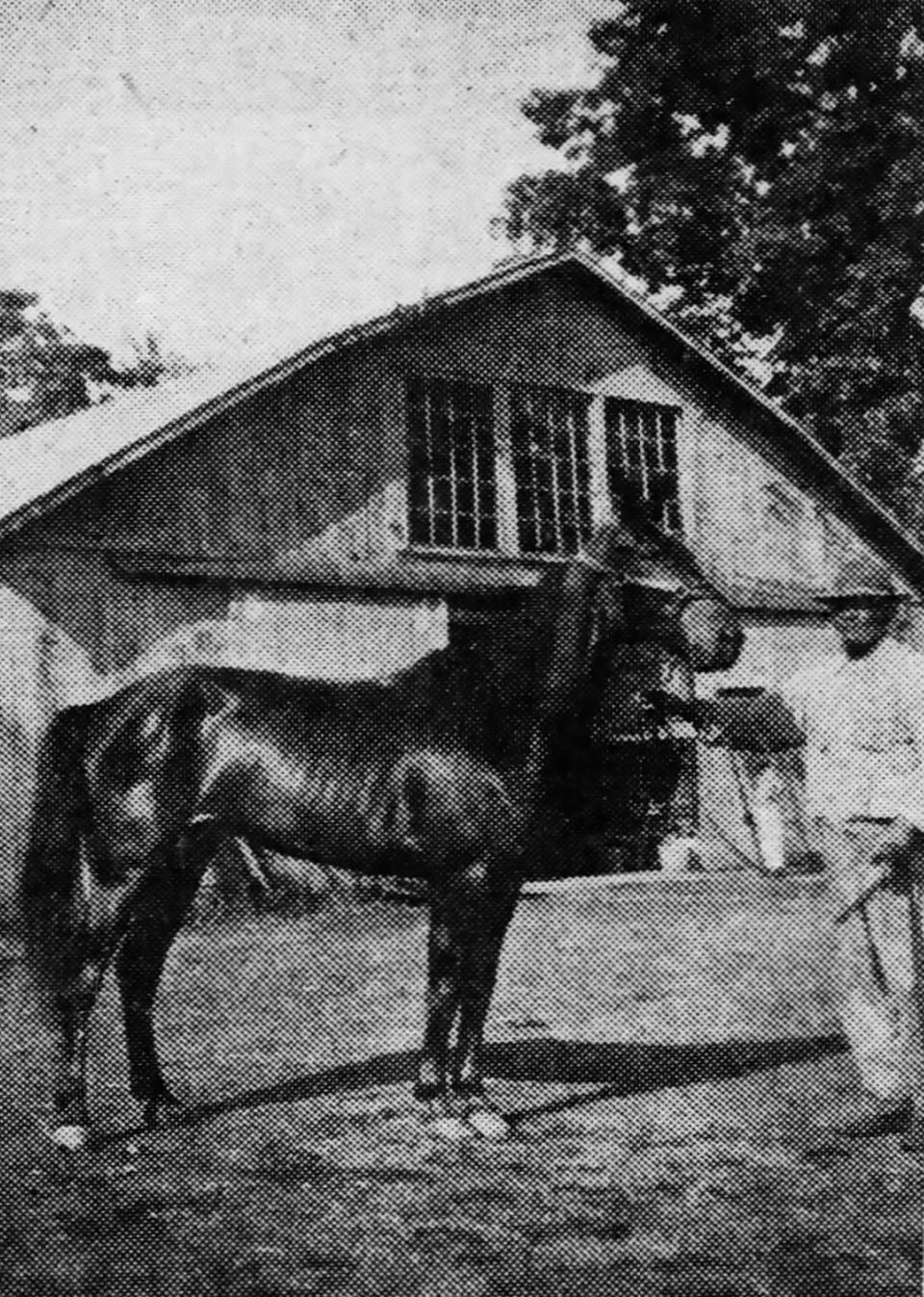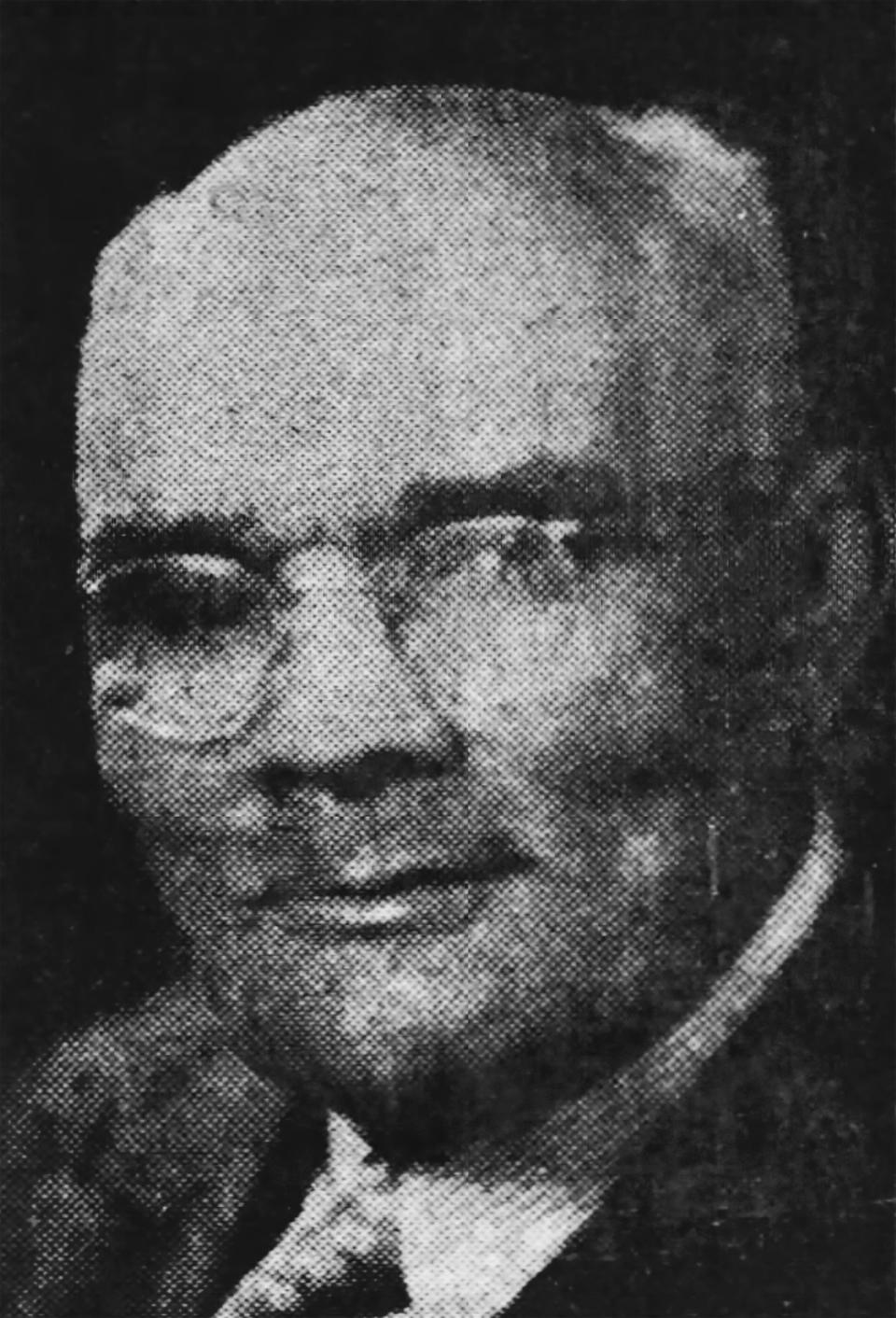ByGone Muncie: Wick Adams known far and wide for his horse training talents
- Oops!Something went wrong.Please try again later.
Downtown Munsonians abruptly awoke in the small hours of Dec. 28, 1892, to the grand Delaware County Courthouse engulfed in flames.
Raging heat blew out second-story windows, sending black plumes of smoke high into the night sky.
The alarm at Engine House No. 1 went off shortly after. At the time, the station was located in Muncie’s first city hall at the northwest corner of Jackson and Jefferson streets.
Per protocol, Chief Granville Shepp banged a giant gong, sending the fire department’s well trained horses running to their harnesses. Within minutes, firefighters were on the square with their horses battling the blaze.

The Daily Herald reported that two water lines “were run up to the courtroom, where the flames were doing the most damage. Here amid the suffocating smoke, the fire boys worked for three hours. It was long after daylight when the last work was done. It was undoubtedly the hardest fight that the Muncie department ever had.”
A faulty gas line in the judge’s chambers had ruptured and ignited, causing the inferno.
The fire destroyed the circuit courtroom, most of the second story, and the roof. Commissioners estimated $50,000 in damage — approximately $1.7 million today.
One of the first responders was a young firefighter named William "Wick" Adams.
The Herald wrote that Adams “displayed great bravery yesterday morning in entering the blazing court room and saving from utter destruction a number of valuable court records.”
Wick Adams was well-known about town at the time.
He was born on Feb. 5, 1871, in a log house at the corner of Washington and Franklin. His father, John, was a porter at Andrew’s Saloon and a veteran of the Civil War. Wick’s mother, Martha, belonged to the Scott family, one of the oldest Black families in Muncie.
Wick found his life’s calling early at the age of 6.
After attending a harness race at the Delaware County Fair, Wick dedicated his life to horse training.
As an adult, he became one of the nation’s most sought-after trainers. By the time he was 30, Wick was traveling across the U.S. to train horses for well-known owners. Local newspapers in the 1890s mention Wick heading to Carson City, Boston, Cleveland, and Louisville for short gigs at famous stables. This work also led him to become a founding member of the Colored Kentucky Derby Club, which he formed with fellow African American horsemen in 1896.
Locally, Wick pursued his passion for many years at Riverside’s Alameda Place farm, managing and training Marcus Claypool’s horses. During the gas boom, Muncie hosted races as part of the Gas Belt Circuit, along with Kokomo, Marion, Logansport, Lebanon, Lafayette, and Frankfort. Wick trained Claypool’s light-harness entries, including those competing nearby at the Delaware County Fairgrounds.
The Muncie Fire Department hired Wick sometime in the early 1890s, principally for his equine expertise.
He’s listed in the 1893 city directory as the driver of Engine House No. 1’s hose wagon.
During the boom, most firefighters held their positions part time, or in Wick’s case, around the racing season. Each Muncie Fire Department member was required to manage at least one horse. Wick took care of three: Killie, who pulled the Babcock Engine, along with George and John, two “dappled grays” who hauled hose. Wick served as a Muncie firefighter off and on until World War I.
His work with horses in Muncie and his stint as a firefighter earned him powerful friends.
Later on, he became active in early 20th century Republican Party politics. Local papers routinely reported on his stump speeches during election years, and he often met GOP dignitaries when they came to town.
Wick Adams was also never far from violence.
In January of 1900, he began boxing at the Onyx Club Gym. The Onyx was a short-lived club above Harry Hope’s popular Capitol Saloon at 109 W. Main St.—west of the original Wysor Opera House and south of courthouse square.
At a bout with Riley Ray on Jan. 1, “the boxing became so spirited that officers were alarmed as to what might happen to Ray, so vicious was Adams in landing.”
Ray, according to the Daily Times, “was unable to withstand the terrible rushes of his opponent.” Muncie police officers on hand called the fight in the third round.
In November, Wick was arrested for assault and battery against Murray Luther, whom the papers described as a Philippine-American War vet. An intoxicated Luther was causing trouble at a saloon and called Wick a racial epithet. When he left, Wick followed him out back and beat the hell out of him in the alley. After witnesses testified to seeing Luther pull a knife, Wick was released and fined $13.40.
He married in October of 1906.
The Evening Press reported that “William ‘Wick’ Adams, a hostler, one of the best known colored men in this city, was married today by Justice I.H. Gray to Narcissa Newton.” The couple settled in Whitely at 1412 Broadway, what is today Dr. Martin Luther King Jr. Boulevard.
In 1914, Wick was badly injured when a Big Four train slammed into his carriage at the crossing on Plum (Pershing) Street. Several other men were in the wain, all of whom were injured, including Pearl Williams who died. Wick suffered “three broken ribs and cuts about his face,” according to the Star.
Three years later, Wick was eating with his friend Sam Wiley at the Grand Hotel, 504 S. Walnut St. A “restaurant clerk” named Grant Curtis, who was once Center Township Assessor, asked the “colored man to use the private dining room in the rear of the restaurant.” It’s not clear in the papers as to who, but either Wick or Wiley grabbed a chair and hit Curtis upside the head with it. Both men plead not guilty to assault and battery. Wiley, who was white, was acquitted and Adams, who wasn’t, was fined $15 plus court costs.
Adams continued managing horses and stumping for GOP candidates into the 1930s.
In January of 1940, he became head of maintenance at the Delaware County Courthouse. By the time of World War II, he had attended every Kentucky Derby since the mid-1890s. A reporter asked him in 1946 how long he would continue training. The old hostler replied “take me away from horses and you might as well lead me to Beach Grove Cemetery.”

He died on March 17, 1948. He was 77.
As predicted, William "Wick" Adams was buried, like all true Munsonians, at Beach Grove Cemetery.
An Evening Press columnist wrote a tribute after his death, concluding that once Wick “marked a man as worthy, not politics nor religion nor money ever made any difference to him. He judged men as he judged horses, on performance, and he was a student of both.”
Chris Flook is a Delaware County Historical Society board member and a Senior Lecturer of Media at Ball State University.
This article originally appeared on Lafayette Journal & Courier: Wick Adams trained horses across the country, but called Muncie home

